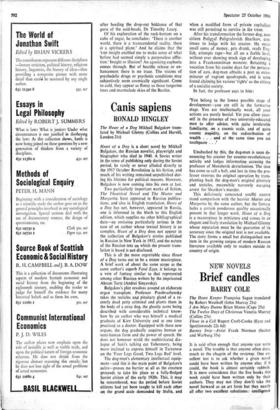Canis sapiens
RONALD HINGLEY
The Heart of a Dog Mikhail Bulgakov trans- lated by Michael Glenny (Collins and Harvill, London 21s) Heart of a Dog is a short novel by Mikhail Bulgakov, the Russian novelist, playwright and biographer who died in 1940. A Soviet writer in the sense of publishing only during the Soviet period, he rarely or never alluded directly to the 1917 October Revolution in his fiction, and much of his writing remained unpublished dur- ing his lifetime for political reasons. However, Bulgakov is now coming into his own at last.
Two particularly important works of fiction,• The Theatrical Novel and The Master. and Margarita, have appeared in Russian publica- tions, and also in English translation. Heart of a Dog has not, however, appeared in Russia, one is informed in the blurb to this English edition, which supplies no other bibliographical data—an omission particularly serious in the case of an author whose textual history is so complex. Heart of a Dog does not appear in the collection of Bulgakov's stories published in Russian in New York in 1952; and the nature of the Russian text on which the present trans- lation is based is not disclosed.
This is all the more regrettable since Heart of a Dog turns out to be a minor masterpiece. A brief work of about the same scope as the same author's superb Fatal Eggs, it belongs to a vein of fantasy similar to that represented among other Russian writers by the imprisoned Abram Tertz (Andrei Sinyaysky).
Bulgakov's plot revolves around an elaborate organ transplant. Professor Preobrazhensky takes the testicles and pituitary gland of a re- cently dead petty criminal and plants them in the body of a stray dog, the ghastly scene being described with considerable technical know- how by an author who was himself a medical graduate of Kiev University and at one time practised as a doctor. Equipped with these new organs, the dog gradually acquires human or semi-human form and the power of speech. He does not however wield the sophisticated dia- logue of Saki's talking cat Tobermory, being more inclined to express himself in Tarzanese on the `Four Legs Good, Two Legs Bad' level.
The dog-man's elementary intellectual equip- ment—and this is the main point of Bulgakov's satire—proves no barrier at all as the creature proceeds to take his place as a fully-fledged Soviet citizen of the early 1920s. This, it may be remembered, was the period before Soviet citizens had yet been taught to kill each other on the grand scale demanded- by Stalin, and when a' modified form of private capitalism was still permitted to survive in the ussa.
After his transformation the former dog, now citizen Poligiaf Poligrafovich Sharikov, con- tinues to lodge with his creator. He steals small sums of money, gets drunk, reads Eng- lish, attempts rape—but all on a feeble level, without ever showing much sign of developing into a Frankensteinian monster. Retaining a vocation from his canine days for the persecu- tion of cats, dog-man obtains a post as exter- minator of vagrant quadrupeds, and is soon found claiming his various `rights' as the citizen of a socialist society.
In fact, the professor says to him : `You belong to the lowest possible stage of development—you are still in the formative stage. You are intellectually weak, all your actions are purely bestial. Yet you allow your- self in the presence of two university-educated men to offer advice, with quite intolerable familiarity, on a cosmic scale, and of quite cosmic stupidity, on the redistribution of wealth . . . and at the same time you eat toothpaste . .
Unabashed by this, the dog-man is soon de- nouncing his creator for counter-revolutionary activity and lodges information accusing the professor of Menshevik deviationism. The time has come to call a halt, and just in time the pro- fessor reverses the original operation by trans. planting back the dog-man's original pituitary and testicles, meanwhile narrowly escaping. arrest for Sharikov's murder.
This deliciously concocted souffle cannot stand comparison with the heavier Master, and. Margarita by the same author, but the fantasy lacks a certain ponderous quality occasionally present in that longer work. Heart of a Dog is a masterpiece in miniature and comes in an elegant and lively translation by Michael Glenny whose reputation must be the guarantee of .its accuracy since the original text is not available, The, story forms a small but distinguished new item in the growing corpus of modern Russian literature available only to readers outside its country of origin.














































 Previous page
Previous page